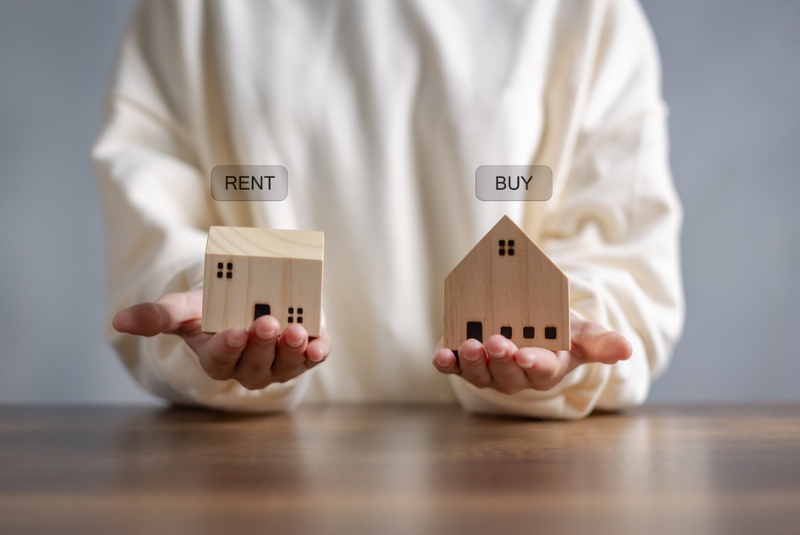Embarking on the journey of finding a place to call home involves a critical decision: to rent or to buy. This guide navigates through the pros and cons of each option, offering valuable insights to help you make an informed choice that aligns with your lifestyle and financial goals.
1. Renting: The Pros and Cons of Flexible Living
Pros of Renting
Flexibility: Renting provides flexibility, allowing you to easily relocate for job opportunities or personal reasons. Leases typically have shorter commitments, offering the freedom to explore different neighborhoods or cities.
Maintenance Responsibility: One of the perks of renting is that landlords are generally responsible for maintenance and repairs. This can save you from unexpected expenses and the hassle of handling household fixes.
Financial Initials: Renting usually requires less upfront financial commitment compared to buying. Security deposits are typically smaller than down payments, making it more accessible for those with limited savings.
Cons of Renting
Limited Equity: Rent payments don't contribute to property ownership. Unlike homeownership, renting doesn't build equity, and you won't benefit from potential property value appreciation.
Rent Increases: Rent prices may increase at the end of lease terms, subjecting renters to fluctuations in housing costs. This lack of cost predictability can impact long-term budgeting.
Limited Customization: Renting often comes with restrictions on making significant changes to the property. Personalization options are limited compared to owning a home.
2. Buying: The Pros and Cons of Long-Term Investment
Pros of Buying
Equity Build-Up: Mortgage payments contribute to building equity. Over time, you gain ownership of your property and benefit from potential appreciation in home values.
Stability: Homeownership provides stability, allowing you to establish roots in a community. It offers a sense of belonging and the opportunity to create a long-term living space tailored to your preferences.
Investment Potential: Real estate can be a lucrative long-term investment. If property values appreciate, homeowners may gain substantial returns on their initial investment.
Cons of Buying
Financial Commitment: Purchasing a home involves a significant financial commitment, including the down payment, closing costs, and ongoing mortgage payments. It may be challenging for those with limited savings or uncertain financial situations.
Responsibility for Maintenance: Homeownership means taking on the responsibility for maintenance and repairs. While it offers control over property decisions, it also requires a commitment of time and money for upkeep.
Market Risks: The real estate market can be unpredictable. Economic downturns or local market changes may affect property values, potentially impacting the financial returns on homeownership.

3. Financial Considerations: Crunching the Numbers
Cost of Renting
Upfront Costs: Renting typically involves lower upfront costs, with a security deposit and sometimes the first and last month's rent being the primary financial requirements.
Monthly Expenses: While monthly rent payments cover the cost of living in the property, they do not contribute to building equity. Renters may also need to budget for potential rent increases over time.
Cost of Buying
Upfront Costs: Buying a home requires a substantial upfront investment, including a down payment, closing costs, and other associated fees.
Monthly Expenses: Monthly mortgage payments include both principal and interest, contributing to equity build-up. Homeowners also incur additional costs such as property taxes, homeowner's insurance, and maintenance.
4. Lifestyle Considerations: Tailoring Your Living Experience
Renting for Flexibility
Job Mobility: Renting is ideal for those expecting changes in their job or personal situation that may require relocation.
Minimal Responsibility: Renting suits those who prefer a living situation with minimal responsibility for property maintenance and repairs.
Buying for Stability
Long-Term Commitment: Homeownership is suitable for individuals or families looking for long-term stability and a sense of community.
Personalization: Homeownership allows for greater customization of living spaces, from renovations to landscaping.
5. Market Trends: Assessing Real Estate Dynamics
Renting in a Changing Market
Flexibility in Market Variability: Renting provides flexibility in adapting to changing market conditions, especially in areas with fluctuating property values.
Renting in Hot Markets: In competitive markets, renting might be a more accessible and practical option, allowing individuals to live in desirable locations without the immediate need for substantial financial investment.
Buying in a Stable or Growing Market
Investment Potential: In stable or growing real estate markets, buying a home offers the potential for a sound long-term investment with the possibility of property value appreciation.
Control in Property Decisions: Homeownership provides individuals with more control over property decisions, allowing them to make changes and improvements as they see fit.
6. Evaluating Your Long-Term Goals: Renting vs. Buying
Renting for Short-Term Goals
Flexibility for Change: Renting aligns with short-term goals, providing the flexibility to adapt to changing circumstances without the commitment of homeownership.
Financial Agility: Renting can offer financial agility, allowing individuals to allocate resources to other investments or lifestyle choices.
Buying for Long-Term Objectives
Building Wealth: Homeownership is a wealth-building strategy, allowing individuals to build equity and potentially benefit from property value appreciation.
Stability for Family Planning: Owning a home provides stability, making it a suitable choice for those planning to start or raise a family.
Crafting Your Path to Home Sweet Home
The decision to rent or buy a home is a multifaceted choice influenced by financial considerations, lifestyle preferences, and long-term goals. This comprehensive analysis explores the pros and cons of each option, offering a roadmap to help you navigate the path to your ideal home. Whether you choose the flexibility of renting or the stability of homeownership, the key lies in aligning your decision with your unique circumstances and aspirations, making your living space truly a home sweet home.




